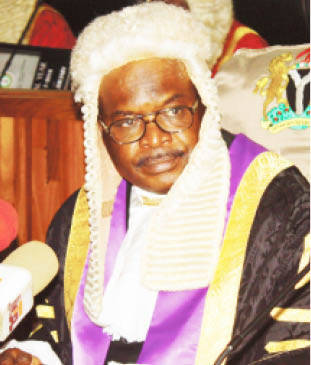FCT High Court’s new rules lift Nigeria justice system
Nigerians who have longed for the day the country joins the league of civilized nations in the speedy dispensation of justice, should be upbeat The Judiciary of the Federal Capital Territory has produced new rules that is set to remodel justice system in Nigeria. Nigerians criticised the country’s justice system this April when the former […]


Nigerians who have longed for the day the country joins the league of civilized nations in the speedy dispensation of justice, should be upbeat The Judiciary of the Federal Capital Territory has produced new rules that is set to remodel justice system in Nigeria.
Nigerians criticised the country’s justice system this April when the former South Korean President, Park Geun-hye was sentenced to 24 years imprisonment and fined $17 million by a court just six months after she was first arraigned in October, 2017. Nigerians are disappointed that such a speedy procedure may never be experienced here.
It is known that justice system in Nigeria is slow with the fate of many litigants trapped in the court room. For the criminal justice system, delays have been fingered as the reason for impunity in the society. Efforts have been made with reforms that produced the Administration of Criminal Justice Act (ACJA) in 2015. But this has not achieved the desired impact as lawyers find means to circumvent and kill off cases through regular adjournments. The backlogs wear down the court proceedings.
The situation is expected to change with the new ‘Practice Direction on the Implementation of the Administration of Criminal Justice Act 2015 in the Courts of the Federal Capital Territory’, and the ‘Civil Procedure Rules 2018’ produced by the FCT High Court.
The Criminal Justice Practice Direction in Order Three provides for a Case Management Hearing system similar to the pre-trial method in the United States criminal justice system. It is referred to as the Case Management Hearing, which holds immediately after arraignment, and will apply to all criminal trials in the Magistrate Courts, High Courts, Upper Area Courts and other courts that try criminal matters in the FCT.
The hearing will trash out the following preliminary issues: a) objections on ground of jurisdiction; b) admission of evidence including statements of the defendants; c) relevant number of witnesses to be called by the parties; d) the non-contentious evidence to be agreed and admitted – ‘evidence agreed’-these evidence shall form part of the record of court without recourse to further conditions for admissibility; e) time estimate and schedule of witnesses for the trial; and f) any other questions of law relating to the case.
Also, Order Seven provides that “where a counsel who was present in court and agreed on the next adjournment date fails to attend the hearing without good reason or sufficient notice, costs may be awarded against him.”
The rule also provides for administrative intervention by the Chief Judge under Order Thirteen, “The Declogging Panel’, which is to recommend measures to the Chief Judge to expedite trial in criminal trials and courts caseloads.
The order provides that: “The Chief Judge may set up a panel of judges which may include magistrates to review and reduce the backlog of cases on the docket of courts. The panel may work by itself or in conjunction with the Administration of Criminal Justice Monitoring Committee (ACJMC).”
The Civil Procedure Rules has provided for a Division for fast-track hearing of civil suits before the court similar to the rules for criminal trials especially, the pre-trial procedure. Order 37 (2) provides for appointment of a Fast-track judge by the Chief Judge, whose duty is to organize pre-trial conference or settlement of issues that are considered expedient in the circumstances.
The Fast-track judge shall also carry out the following functions under Order 37 (2): a) Process Fast Track cases; b) monitor the performance of the Fast Track Division and submit weekly and monthly performance appraisal report to the Chief Judge; c) make recommendations on how to improve the operation of the Fast Track Division; d) publish the weekly cause list every Friday or on an earlier day if Friday is a public holiday; e) manage, coordinate and supervise the operation of the Fast Track Division; and f) perform any other function that may be assigned to him by the Chief Judge.
The new practice directions were produced by the efforts of the Chief Judge of the FCT High Court, Justice Ishaq Bello and his team in the exercise of the provisions of Section 259 of the Constitution of Federal Republic of Nigeria, 1999; Section 490 (g) of the Administration of Criminal Justice Act 2015.
Lawyers however have mixed reactions on the new rules. For Barrister Tochukwu Ohazurike the reforms in the new Practice Directions is a good development for speedy justice delivery. He noted the similarity of the new rule with the Front-Loading procedure, which is already in place in the courts and which have been “rubbished by lawyers” together with the ACJA.
He recommended that lawyers, who file cases should attach the documents to be relied on through a letter to the opposing lawyer, who will reply in the same correspondence the issues they agree or refuse in the suit.
Also speaking, Abuja-based lawyer, Joseph Silas Onu said practice direction alone will not take the country to the era of speedy dispensation of justice.
This is not the first set of practice directions or laws for speedy conclusion of cases in courts, but this approach accommodates procedures used in more civilized countries. Many states should adopt similar procedures including the existing ACJA. It may not be an immediate solution to delays in justice delivery in Nigeria, but gradually there will be improvement.
